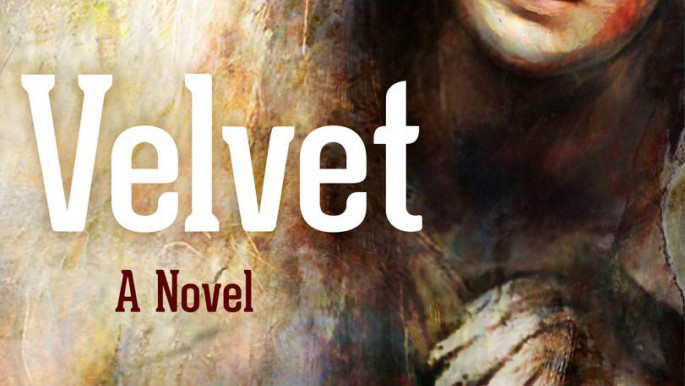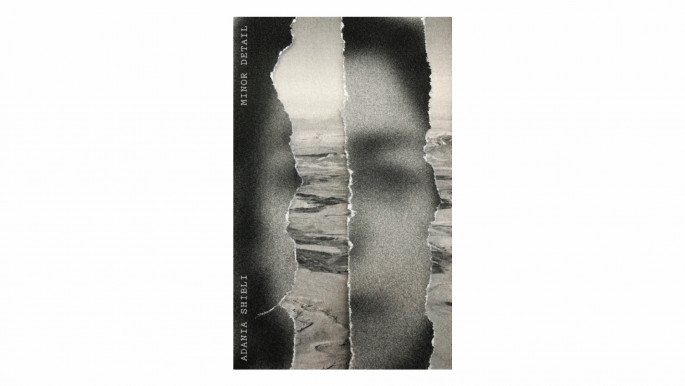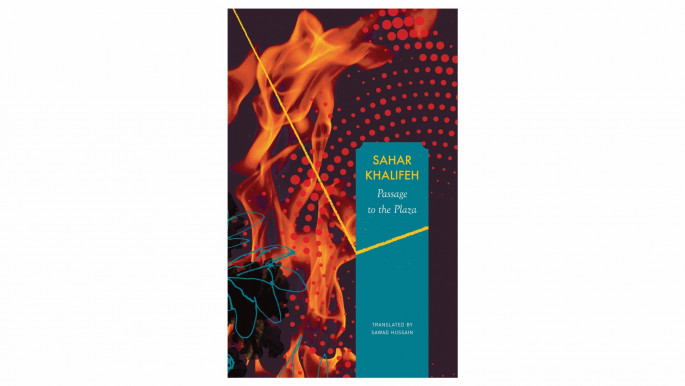Palestinian novelist Huzama Habayeb on literature, memory and displacement
Palestinian novelist, short story writer and poet Huzama Habayeb, a second-generation Palestinian refugee born and raised in Kuwait, is the author of Velvet, a novel that follows the trajectory of a Palestinian woman living in Al-Baqaa refugee camp in Jordan.
Rich in language and metaphor, Habayeb's novel also provides a critique of Palestinian society while tracing the roots of displacement and memory.
Speaking to The New Arab, Habayeb's discussions on Palestinian displacement, personal and collective memory, as well as language and writing, shed light on how the author relates to Palestine, exile, memory and nostalgia.
Palestinian collective narratives, as Habayeb explains, are inclusive and reflect a paradoxical reality for Palestinians; that belonging is found in the experience of displacement.
The New Arab: Can you speak about the ramifications of displacement for Palestinian women?
Huzama Habayeb: Throughout history, displacement has taken a painful toll on Palestinian women who had to endure the ramifications of an ongoing loss. New generations of women are bequeathed with the legacy of uprooting, and everyday life conflicts are entwined with political, religious, and social disappointments and betrayal. For them, the 'Palestinian Question' is engulfed by so many existential questions and fears.
 |
Collective narratives reflect a paradoxical reality for Palestinians; that belonging is found in the experience of displacement |  |
The women I know and portray in my novels and stories can be as apolitical as far as they can, indulging in their own personal joys, small victories, unfulfilled lusts, pains, sorrows, aspirations and frustrations, yet, they are, unknowingly and unconsciously, entrenched deeply in the politics of being Palestinian.
Displacement is a stark reminder of this reality; they are the outcome of an ongoing attempt to curb or contain the manifestations of their identity and the feelings and "practices" that come with it. These women are told over and over again they are not what they think they are, or to be up to what is expected of them, under the "ethics of displacement", which makes it more painful for them, either way. Besides dealing with their own disappointments; they also have to make it through decades-long national disappointment.
 |
|
These women survive through an immense power of love, which is undefeatable. Their passion comes with a resilience of its own, allowing them to fight for the things that mean the most to them, visible in the small pleasures that embroider the tapestry of their lives, which make it more colourful, endurable and worthwhile.
Through love, these women can maintain unbreakable souls and survive, finding a place in displacement.
The New Arab: How do you relate to female narratives from Palestinian refugee camps and how does this influence your literature?
Huzama Habayeb: My personal narrative is woven from the same rich fabric of history and elements of the vivid Palestinian culture; the food, the songs, the thobe, the camp, the age-old love songs and colourful wedding songs, the stories and fairy tales, the yearnings and longings, the ecstasies and agonies; and even in the trivia that makes certain moments of life so special and so precious.
Recently, a distant memory stirred in my mind, which echoed an emotional experience of one of my favourite protagonists. In Velvet, Hawwa buys an expensive piece of velvet, which she has been dreaming of for so long, imagining herself in a dark purple velvet dress she makes for herself as a well-deserved reward to celebrate her newly found love.
Velvet, an adored fabric for the women in the novel, creates a stark juxtaposition against the backdrop of the camp life intertwined with misery, festering emotions and the dominant sense of decay.
I related to Hawwa's feelings. Years ago, I went against all odds just to buy an expensive dress. I was a college student, dependent on my father, whose monthly payment would barely make ends meet. I still remember that day when I was on my way home, holding the shopping bag with the dress carefully folded inside. I could smell the freshness of the fabric, that aromatic fusion of something new, pretty and precious with endless possibilities. At the time, I was the happiest and the most beautiful woman in the world.
This memory never crossed my mind when writing Velvet. I think it was in my subconscious, peeking into Hawwa's world, which is different. Yet, it remains within the context of the bigger Palestinian narrative, which I am part of.
 |
Palestinian female narratives can be an extension of me, of my passions, my fears, my dreams and my nightmares. We are all part of one epic narrative, which is still being lived and written |  |
I am born out of the extreme, standing on the edge of things, and always in a relentless quest to circumvent the huge loss of home, which I am born with already, and which can never be barred by the lapse of time, or redeemable. These Palestinian female narratives can be an extension of me, of my passions, my fears, my dreams and my nightmares. We are all part of one epic narrative, which is still being lived and written.
The New Arab: Having been born in exile, how does one relate to remembrance or nostalgia of the homeland?
Huzama Habayeb: I was raised as a Palestinian. I was reminded of this distinctive "state of being" every single day, not only within the confines of my family and the extended family, but also in the displacement geography as a whole, in the diasporic communities.
 |
|
| Minor Detail: A haunting meditation on violence and memory in Palestine |
I was born in Kuwait and spent almost half of my life there. I never felt I belonged there, where Palestinians lived in ghetto-like clusters. Such living arrangements made us more Palestinian - we enhanced our collective memory to be part of our personal memories.
I never felt I belonged anywhere. I am not displaced as much as I am "out of place" to echo Edward Said's brilliant "diagnosis".
Born and living in exile had me glued to my homeland, something reinforced by almost total disengagement from the place I grew in, or any other place I have lived in afterwards.
Being raised in a Palestinian household, and reminded of who you are, and what you are, and of the heavy legacy-turned into-a-burden sometimes, which you have to carry most of your life, you tend to "Palestinise" things. Palestinisation becomes an inbuilt way of thinking and living. It is a means to stand up against all attempts to negate me, confiscate my legacy and deny me the right of defending what I stand for.
For me, writing safeguards the Palestinian narrative by recreating the collective memory and incarnating the nostalgic flow of images, sounds, smells, vivid lives and stories. Writing can be a continuously widened cycle of love and longing. I will explain by sharing something personal.
 |
When I write I do not think of words. I see them, I listen to them, and I feel them |  |
Whenever I peel or smell an orange, I remember my father, who passed away more than five years ago. My father loved oranges. He could do without bread but never without oranges. Whenever I visited him, he would make a feast of oranges. However, the oranges I smell right now conjure an image of the child my father once was, the one whom I've never known or had a photo of, not the old man I've known so well.
My father was driven out of his village, Bayt Dajan, southeast of Jaffa, with his family in the 1948 Nakba. He was seven years old and this memory etched itself in his mind for years to come. When they had to leave their home, he took one orange with him, which he picked from a nearby orange grove and grabbed it tightly with one hand, while holding onto his mum with the other.
 |
|
| Passage to the Plaza: Palestinian women tell the story of revolution |
Marching into displacement, where he was among the first refugee groups, his nose was infused with the smell of the luscious fruit. That was the last smell of Palestine he retained, a smell he spent most of his life trying to recreate and keep. Whenever I smell an orange, I see that little kid, and I smell the Palestine he knew. This is my cycle of love and longing.
The New Arab: Your novel, Velvet, is powerful in revealing the characters' innermost feelings and conflicts. Can you describe the dynamics of language, memory and imagination in terms of your literature?
Huzama Habayeb: Language for me has always been more than a carrier of thoughts or ideas. It is a living concept that adapts its expressive powers to fit the narrative and embody the underlying feelings that infiltrate through the layers of the writing. I never look at language as a tool or a skeleton. Language is the flesh of writing that gives it tangibility; and it is also the soul of the creative process, which makes it accessible and perceivable. This is what makes writing organic and relatable.
When I write I do not think of words. I see them, I listen to them, and I feel them. They flow inside me in all their shapes, colours and clamours, sweeping through my senses. For me, writing is a process entailing complete surrender. I thrive and survive through written worlds that are highly charged with images and sounds where I become totally immersed in it.
Once I'm finished, I feel drained, while the words and emotions still clatter inside me. I remember when I wrote the last word in Velvet, I dragged myself to bed. I felt exhausted, withered and consumed by utter fatigue. I do feel I write with my body as much as I write with my soul.
Ramona Wadi is an independent researcher, freelance journalist, book reviewer and blogger specialising in the struggle for memory in Chile and Palestine, colonial violence and the manipulation of international law.
Follow her on Twitter: @walzerscent
Read more from The New Arab Meets special section below:
 |
|





 Follow the Middle East's top stories in English at The New Arab on Google News
Follow the Middle East's top stories in English at The New Arab on Google News


